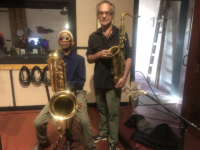The opening blasts of “Ornette” signaled the first volleys of a revolution in 1966 much as the song’s namesake did some eight years earlier with Something Else!!!!. Sound is the first album by another notoriously insurgent saxophonist, Roscoe Mitchell, but more broadly, the point where the recorded history of Association for the Advancement of Creative Musicians (AACM) and the Chicago improvised music scene began. Mitchell and a band that included other future AACM legends made a record that took the ‘new thing’ movement being advanced at the time and removed from it the final vestiges that tethered it however tenuously to jazz tradition, placing a greater emphasis on wide open spaces and group improv. That’s why the five-letter title itself makes such a powerful statement: it breaks down the primary concept of music as being not of an organized structure of harmony and rhythms but an informal, fully instinctual convocation that re-imagines what sounds music can make.
The Chicago-based Delmark Records was responsible for bringing Sounds to an unsuspecting public back in 1966. Its latest reissue, currently due out October 4, 2018, for the first time restores Stu Black’s original analog mix for the digital format and more than five decades later, this album remains constantly surprising, exhilarating and cutting-edge.
Mitchell was not widely known before this disruptive debut — the AACM was only a year old — and neither were trumpeter Lester Bowie, bassist Malachi Favors, cellist/trombonist Lester Lashley, tenor saxophonist Maurice McIntyre and percussionist Alvin Fielder. Mitchell, Bowie and Favors would go on to form the Art Ensemble of Chicago a few years later and make more history but what they did then can be traced to this record.
In adopting ideas from Ornette Coleman, the song named after him seems grounded and structured compared to the rest of the album, which serves to illuminate how radical were Mitchell’s ideas were. Even so, Bowie’s horn blasts pierce through the raucous drums like a sharpened machete, and Favors and Lashley form a string subsection like no other, facing off in a lively, plucking rivalry.
The eccentricities — even within the realm of free jazz — didn’t stop with Lashley playing his cello like a high-pitched bass and pairing up with a real bass. On “The Little Suite,” Mitchell can be heard swapping through what must be at least a half dozen instruments, including flute, recorder, clarinet, toys and bicycle horns, and Bowie himself picks up harmonica. Favors and Lashley continue with non-linear low lines and Fielder dives headlong into the noise pit provided by Mitchell and Bowie. The start-stop nature of abrasive tone clusters eventually gives way to an all-out, six-man free-for-all, magically collecting itself in time to bring the song to a peaceful conclusion.
“Sound” is the keystone performance, a twenty-two minute statement encapsulating how beauty can come out of music devoid of any discernible structure and little preconception. It’s here, with spare backdrop, where Mitchell as a saxophonist is proven as a unique talent apart from his Ayler and Coltrane contemporaries, sharing their passion and spirituality but also standing further apart from the roots from whence they all came from (McIntyre and Lashley on trombone also put in powerful performances). Favors enjoys a spotlight late into the performance that’s similarly guttural and without precedence in approach.
Thanks to the blessing of the longer CD format, two more recordings from the Sound session can be added. “Ornette (alternate)” includes an interesting passage early in the song whereby Mitchell and then Bowie conjoin with Favors for a rhythmically charged passage. “Sound (take 1)” goes on for four minutes longer than the take that was deemed the best, but beyond the somber opening segment, the song goes down different alleys, such as Bowie straining to get out anguish notes as Fielder manipulates the high-hat cymbals like a boss. Mitchell is later heard extracting sonorities from his sax that are downright alien to the instrument.
We’ve frequently devoted this space to describing amazing avant-garde records from major outside jazz figures such as Fred Anderson, The Chicago Underground, Anthony Braxton, Henry Threadgill and — even now — Roscoe Mitchell himself. But before those recordings could happen, Sound needed to.
- Nick Millevoi – ‘Moon Pulses’ (2024) - April 23, 2024
- Cannonball Adderley – ‘Poppin’ in Paris: Live at L’Olympia 1972′ (2024) - April 20, 2024
- Christian Marien Quartett – ‘How Long Is Now’ (2024) - April 18, 2024




